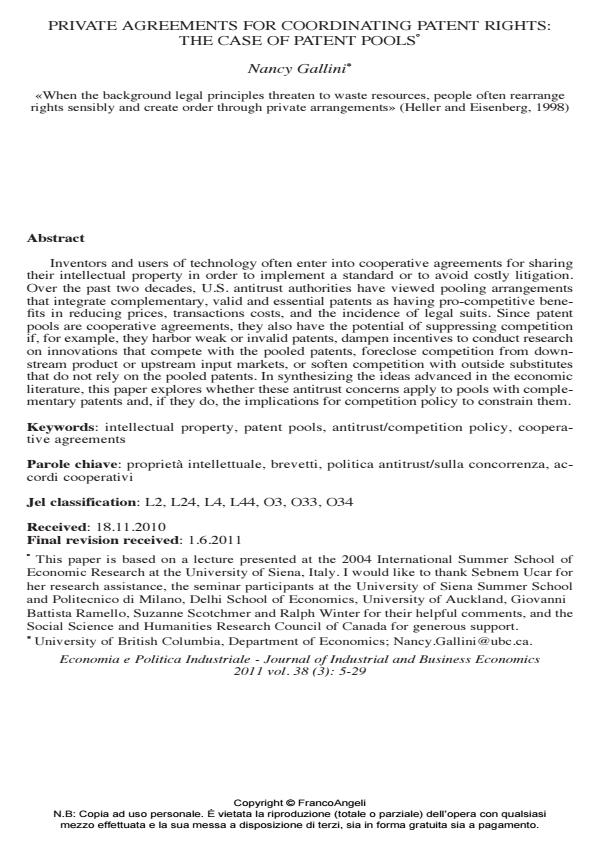Private agreements for coordinating patent rights: the case of patent pools
Journal title ECONOMIA E POLITICA INDUSTRIALE
Author/s Nancy Gallini
Publishing Year 2011 Issue 2011/3
Language English Pages 26 P. 5-30 File size 252 KB
DOI 10.3280/POLI2011-003001
DOI is like a bar code for intellectual property: to have more infomation
click here
Below, you can see the article first page
If you want to buy this article in PDF format, you can do it, following the instructions to buy download credits

FrancoAngeli is member of Publishers International Linking Association, Inc (PILA), a not-for-profit association which run the CrossRef service enabling links to and from online scholarly content.
Inventors and users of technology often enter into cooperative agreements for sharing their intellectual property in order to implement a standard or to avoid costly litigation. Over the past two decades, U.S. antitrust authorities have viewed pooling arrangements that integrate complementary, valid and essential patents as having pro-competitive benefits in reducing prices, transactions costs, and the incidence of legal suits. Since patent pools are cooperative agreements, they also have the potential of suppressing competition if, for example, they harbor weak or invalid patents, dampen incentives to conduct research on innovations that compete with the pooled patents, foreclose competition from downstream product or upstream input markets, or soften competition with outside substitutes that do not rely on the pooled patents. In synthesizing the ideas advanced in the economic literature, this paper explores whether these antitrust concerns apply to pools with complementary patents and, if they do, the implications for competition policy to constrain them.
Keywords: Intellectual property, patent pools, antitrust/competition policy, cooperative agreements
Jel codes: L2, L24, L4, L44, O3, O33, O34
- The simple economics of class action: private provision of club and public goods Alberto Cassone, Giovanni B. Ramello, in European Journal of Law and Economics /2011 pp.205
DOI: 10.1007/s10657-011-9254-7 - Cooperating with competitors: Patent pooling and choice of a new standard Nancy Gallini, in International Journal of Industrial Organization /2014 pp.4
DOI: 10.1016/j.ijindorg.2014.02.003 - Trust, Incomplete Contracts and the Market for Technology Paul H. Jensen, Alfons Palangkaraya, Elizabeth M. Webster, in SSRN Electronic Journal /2013
DOI: 10.2139/ssrn.2226727 - Patent Pools, Competition, and Innovation—Evidence from 20 US Industries under the New Deal Ryan Lampe, Petra Moser, in Journal of Law, Economics, and Organization /2016 pp.1
DOI: 10.1093/jleo/ewv014 - Patent pools, litigation, and innovation Jay Pil Choi, Heiko Gerlach, in The RAND Journal of Economics /2015 pp.499
DOI: 10.1111/1756-2171.12095 - Trust and the market for technology Elizabeth M. Webster, Paul H. Jensen, Alfons Palangkaraya, in SSRN Electronic Journal /2021
DOI: 10.2139/ssrn.3952258 - Patent Pools: Licensing Strategies in the Absence of Regulation Ryan Lampe, Petra Moser, in SSRN Electronic Journal /2012
DOI: 10.2139/ssrn.2053797 - Trust and the market for technology Paul H. Jensen, Alfons Palangkaraya, Elizabeth Webster, in Research Policy /2015 pp.340
DOI: 10.1016/j.respol.2014.10.001 - Extracting value from ipr through patent brokerage Mario F. Benassi, Gidion T. Geenen, in ECONOMIA E POLITICA INDUSTRIALE 4/2014 pp.89
DOI: 10.3280/POLI2013-004004
Nancy Gallini, Private agreements for coordinating patent rights: the case of patent pools in "ECONOMIA E POLITICA INDUSTRIALE " 3/2011, pp 5-30, DOI: 10.3280/POLI2011-003001